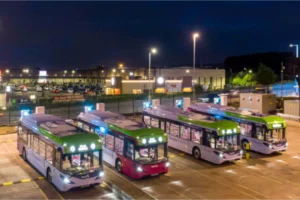The number of apprenticeships started in the transport sector was under half the original target according to figures from the Strategic Transport Apprenticeship Taskforce (STAT).
In the last five years, 11,254 have started in road and rail organisations but this is less than the 30,000 target set by government in 2015 and the revised target of 15,200, althrough there was a increase in starts in 2019/20.
The taskforce said there were 3,238 starts were reported in 2019/20, an increase of 8% from 2018/19. BAME representation now stands at 21%, ahead of the target of 20%. Female proportion of technical and engineering
starts is down to 12%, with the target 20%, it says.
There has been continued growth in degree level apprenticeships, which now accounts for 11% of starts in 2019/20 – up from 3.5% in 2016/17. This represents 363 roles this year compared to 199 in 2018/19. Of these 363 roles, 13% of apprentices are from a BAME background. Internally within the organisations of DfT, Highways England, HS2, Network Rail and TfL, STAT have reported 1,207 starts in 2019/20, compared to 1,179 in 2018/19,
representing an increase.
The largest volume of starts in the last few years has come via the
rail sector. In 2018, train operating companies (TOCs) embraced the
Level 3 Train Driver Apprenticeship Standard and begun welcoming
their first cohorts of Apprentice Drivers over the course of the year.
The taskforce said: ” Over the course of the Autumn of 2020, work
will begin on developing a refreshed strategy to replace the TISS and outline a new set of longterm strategic aims. These will refocus the work
of STAT to ensure that it not only continues with the good work it has achieved in the last four years, but that it supports economic recovery and
prioritises workstreams that reflect the changed circumstances we find
ourselves in.”National Skills Academy Chief Executive for Rail and Interim Chair of STAT Neil Robertson said: “While we have made some good progress on this agenda, there is more work to do to understand the data and deepen our understanding of some of the issues and barriers for underrepresented groups joining, or leaving, the sector.
“There will also be new priorities, to address the new context we find ourselves in. The COVID-19 pandemic has impacted the transport industry heavily, and the implications for skills, training and employment cannot be underestimated.”





















